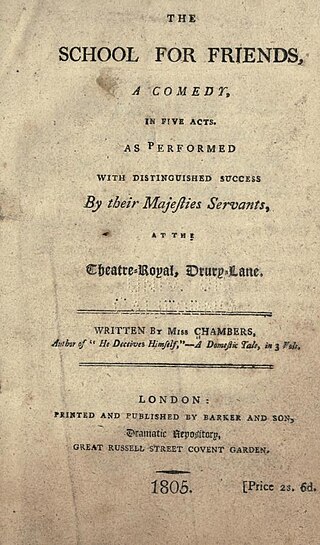
The School for Friends is an 1805 comedy play by the British writer Marianne Chambers. It premiered at the Theatre Royal, Drury Lane in London on 10 December 1805. The Drury Lane cast featured Robert William Elliston as Lord Belmour, Richard Wroughton as Sir Felix Mordant, William Barrymore as Sir Edward Epworth, William Dowton as Mr. Hardy, Charles Mathews as Matthew Daw, Walter Maddocks as Landlord, Jane Pope as Lady Courtland, Dorothea Jordan as Mrs. Hamilton, Harriet Siddons as Miss Emily, Harriet Mellon as Lucy and Charlotte Tidswell as Sarah. The prologue was written by James Kenney. It appeared for 25 performances on its initial run.

Ourselves is an 1811 comedy play by the British writer Marianne Chambers. It premiered at the Lyceum Theatre in London on 2 March 1811. The Lyceum was at the time hosting the company of the Theatre Royal, Drury Lane while it was rebuilt following damage by an 1809 fire. It was Chambers' second staged work following the successful The School for Friends in 1805. The cast included William Dowton as Sir John Rainsford, Benjamin Wrench as Sir Sydney Beaufort, Charles Holland as Fitzaubin, John Henry Johnstone as O'Shanauhan, Vincent De Camp as Darlington, William Penley as Cuff, Maria Rebecca Davison as Miss Beaufort, Julia Glover as the Unknown Lady and Sarah Harlowe as Mrs O'Shanauhan. It was performed sixteen times on its original run.

Five Thousand a Year is a 1799 comedy play by the British writer Thomas John Dibdin.
Marmaduke Watson was an English stage actor of the seventeenth century. Part of the King's Company based at the Theatre Royal, Drury Lane, he was one of the actors who sided with Charles Killigrew during a dispute in the company in 1677. In 1682 when the United Company was formed he left and went to Dublin to join the Smock Alley Theatre. He later returned to London where his final known performances were with Thomas Betterton's company at the Lincoln's Inn Fields Theatre.

The Curfew is a historical tragedy by the British writer John Tobin which was first published in 1807, three years after the author's death. It was staged by Richard Brinsley Sheridan at the Theatre Royal, Drury Lane in London premiering on 19 February 1807. The cast included William Barrymore as Hugh de Tracy, John Bannister as Robert, Henry Siddons as Bertrand, William Penley as Walter, Robert William Elliston as Fitzharding, Edmund John Eyre as Philip, Jane Powell as Matilda and Maria Duncan as Florence. It appeared at the Crow Street Theatre in Dublin on 1 April the same year. It is set during the Norman era.

Bertram; or The Castle of St. Aldobrand is an 1816 Gothic tragedy by the Irish writer Charles Maturin, his first and most successful play. It premiered at the Theatre Royal, Drury Lane in London on 9 May 1816. The original case included Edmund Kean as Bertram, Alexander Pope as St Aldobrand, Charles Holland as Prior of St Anselm, John Powell as Monk, Thomas Cooke as Robber, Margaret Somerville as Imogine and Susan Boyce as Clotilda. The prologue was written by John Hobhouse. The 1827 opera Il pirata composed by Vincenzo Bellini uses a libretto by Felice Romani inspired by Maturin's work.

John Bull is an 1803 comedy play by the British writer George Colman the Younger. It premiered at the Theatre Royal, Covent Garden on 5 March 1803. The original cast included George Frederick Cooke as Peregrine, Henry Erskine Johnston as Frank Rochdale, Charles Klanert as Williams, John Waddy as Lord Fitz-Balaam, William Thomas Lewis as Honourable Tom Shuffleton, John Henry Johnstone as Dennis Brulgruddery, John Fawcett as Job Thornberry, George Davenport as Mr Pennyman, John Emery as Dan, Nannette Johnston as Lady Caroline Braymore, Mary Ann Davenport as Mrs Bulgruddery and Maria Gibbs as Mary Thornberry. The prologue was written by Thomas Dibdin. Its Irish premiere was at Dublin's Crow Street Theatre on 18 May 1803.
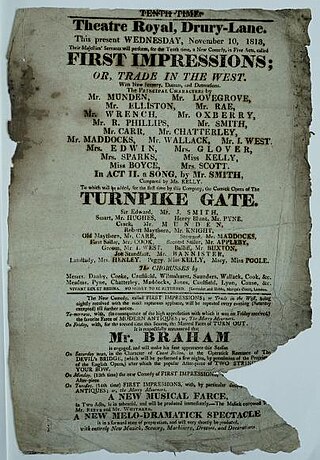
First Impressions is an 1813 comedy play by the British writer Horatio Smith. It was first performed at the Theatre Royal, Drury Lane on 30 October 1813. The original cast included Joseph Munden as Sir Thomas Trapwell, Alexander Rae as Fortescue, Robert Elliston as Harcourt, William Lovegrove as Sir Toby Harbottle, William Oxberry as Sapling, Benjamin Wrench as Professor Trifleton, Julia Glover as Laetitia Freemantle, Elizabeth Rebecca Edwin as Lady Trapwell, Sarah Sparks as Lady Anemone, Frances Maria Kelly as Louisa and Susan Boyce as Phoebe. It lasted for fifteen performances on its original run. It's Irish premiere took place at the Crow Street Theatre in Dublin on 27 January 1814.

The Gazette Extraordinary is a comedy play by the British writer Joseph George Holman, published and first performed in 1811. It premiered at the Theatre Royal, Covent Garden in London on 23 April 1811 The original cast included Charles Mayne Young as Lord De Mallory, Joseph Shepherd Munden as Heartworth, William Barrymore as William Clayton, John Fawcett as Doctor Suitall, Charles Murray as Randall, Nannette Johnston as Lady Julia Sandford, Mary Catherine Bolton as Miss Alford, Mary Ann Davenport as Mrs Leech and Sarah Booth as Ellen Meredith. It was acted eleven times during its initial run.
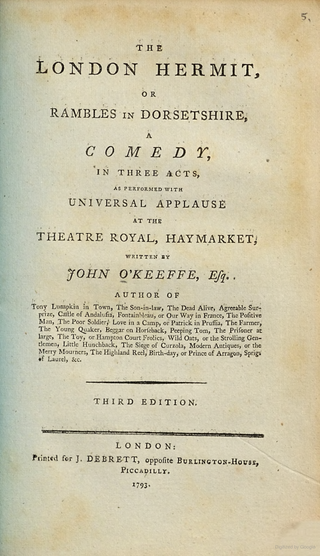
The London Hermit, Or, Rambles in Dorsetshire is a 1793 comedy play by the Irish writer John O'Keeffe. It was staged at the Theatre Royal, Haymarket on 29 June 1793. The original cast included Richard Suett as Whimmy, James Aickin as Old Pranks, John Bannister as Young Pranks, Howard Usher as Barleycorn, Ralph Wewitzer as Barebones, John Henry Johnstone as Tully, William Parsons as Toby Thatch, Lydia Webb as Mrs. Maggs, Elizabeth Kemble as Kitty Barleycorn and Jane Powell as Fishwoman. The prologue was written by George Colman the Younger and spoken by William Barrymore. It was staged at the Crow Street Theatre in Dublin in 1795.

Ways and Means; Or, a Trip to Dover is a 1788 comedy play by the British writer and theatre manager George Colman the Younger. It premiered at the Theatre Royal, Haymarket in London with a cast that included John Bannister as Sir David Dunder, John Palmer as Random, James Brown Williamson as Scruple, James Aickin as Old Random, Howard Usher as Paul Peery, Lydia Webb as Lady Dunder and Elizabeth Kemble as Harriet. Its Irish premiere was at the Crow Street Theatre in Dublin on 24 April 1793.

Zorinski is a 1795 historical tragedy by the British writer Thomas Morton. It first appeared at the Theatre Royal, Haymarket in London with a cast that included William Barrymore as Zorinski, James Aickin as Casimir, King of Poland, Robert Bensley as Rodomsko, Charles Kemble as Radanzo, John Bannister as Zarno, John Henry Johnstone as O'Curragh, Richard Suett as Amalekite, John Fawcett as Witski, Thomas Caulfield as Naclo, Elizabeth Kemble as Rosolia and Maria Bland as Winifred. It included music composed by Samuel Arnold. The Irish premiere was at the Crow Street Theatre in Dublin on 28 November 1795. It is also known by the alternative title Casimir, King of Poland

The World in a Village is a 1793 comedy play by the Irish writer John O'Keeffe. It was staged at the Theatre Royal, Covent Garden in London on 23 November 1793. The original cast included John Powell as Sir Henry Check, John Henry Johnstone as Captain Mullinahack, James Middleton as William Bellevue, Joseph George Holman as Charles, Thomas Hull as Willows, William Cubitt as Captain Vanslueisen, William Macready as Briers, John Fawcett as Master Jack, William Thomas Lewis as Grigsby, Joseph Shepherd Munden as Jollyboy, Harriet Pye Esten as Louisa, Isabella Mattocks as Mrs Allbut and Susan Fawcett as Mrs. Bellevue. It's Irish premiere took place at the Crow Street Theatre on 25 November 1794.

The Surrender of Calais is a 1791 historical play by the British playwright George Colman the Younger with elements of tragedy and comedy. It premiered at the Theatre Royal, Haymarket in London on 30 July 1791. The original cast included James Brown Williamson as King Edward, George Bland as Harcourt, Howard Usher as Sir William Manny, John Bannister as La Gloire, John Powell as Arundel, James Aickin as John de Vienne, John Palmer as Ribaumont, Robert Bensley as St. Pierre, John Henry Johnstone as O'Carroll, Henry Erskine Johnston as Old Man, Elizabeth Kemble as Julia, Maria Bland as Madelon and Charlotte Goodall as the Queen. It is set against the backdrop of the Siege of Calais (1346-47) by Edward III during the Hundred Years War.
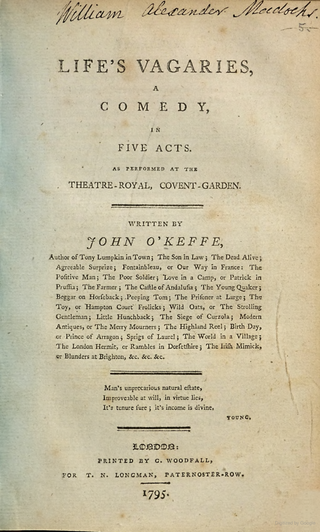
Life's Vagaries is a 1795 comedy play by the Irish writer John O'Keeffe. It was first performed at the Theatre Royal, Covent Garden in London on 19 March 1795. The original cast included John Bernard as Lord Torrendel, William Thomas Lewis as Lord Arthur D'Aumerle, Joseph Shepherd Munden as Sir Hans Burgess, John Quick as Dickins, John Fawcett as George Burgess, John Henry Johnstone as Timolin, Edward Townsend as Robin, Charles Farley as Leillet, Tryphosa Jane Wallis as Augusta and Jane Pope as Lady Torrendel. It's first Dublin performance was at the Crow Street Theatre on 7 January 1796.
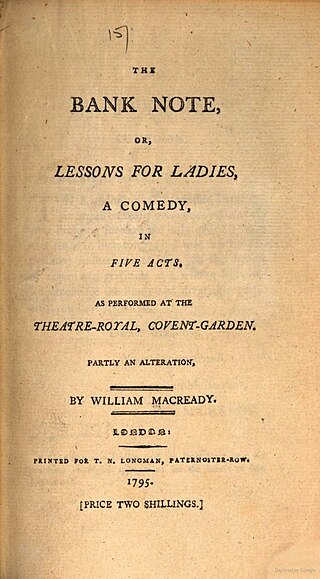
The Bank Note: Or Lessons for Ladies is a 1795 comedy play by the Irish writer and actor William Macready the Elder. It premiered at the Theatre Royal, Covent Garden in London on 1 May 1795. The original cast included Macready as Lieutenant Selby, Joseph George Holman as Sir Charles Leslie, James Middleton as Bloomfield, Thomas Hull as Father, John Fawcett as Ned Dash, John Quick as Hale, John Henry Johnstone as Killeavy, Edward Townsend as Tim, Isabella Mattocks as Mrs Bloomfield, Mary Ann Davenport as Lady Supple and Tryphosa Jane Wallis as Miss Russel. The Irish premiere took at the Crow Street Theatre in Dublin on 22 April 1796 Its plot draws inspiration from William Taverner's The Artful Husband as well as other earlier plays.
Edward Evans Townsend (1766–1809) was a Welsh stage actor and singer. After making his reputation as a touring actor in Yorkshire, notably at Hull under the management of Tate Wilkinson, he was at the Theatre Royal, Norwich in the early 1790s. He also appeared in Ireland at the Crow Street Theatre and the Theatre Royal, Cork.

The Birth Day or The Birth-day is a 1799 comedy play by the British author Thomas John Dibdin. It was based on the work Die Versöhnung by the German author August von Kotzebue, which Dibdin translated and rewrote for the English stage. It premiered at the Theatre Royal, Covent Garden on 8 April 1799. The Covent Garden cast included Joseph Shepherd Munden as Captain Bertram, John Fawcett as Jack Junk, John Henry Johnstone as Harry Bertram, Charles Murray as Mr. Bertram, John Waddy as Lawyer Circuit, Jane Pope as Emma and Mary Ann Davenport as Mrs Moral. Fawcett's character Jack Junk, a sailor, was a reprisal from the popular 1798 musical The Mouth of the Nile by Dibdin. The Irish premiere took place at the Crow Street Theatre in Dublin on 25 November 1799.

The Rival Sisters is a 1793 tragedy by the Irish writer Arthur Murphy. His final play, it premiered at the Theatre Royal, Haymarket in London on 18 March 1793. It had been first written in 1783 and then published in 1786. It was staged by the company of the Drury Lane company under Richard Brinsley Sheridan who were at the Haymarket while their own theatre was rebuilt. The London cast included Sarah Siddons as Ariadne, Jane Powell as Phaedra, John Philip Kemble as Perithous, Richard Wroughton as Periander, King of Naxos, Robert Palmer as Theseus, John Hayman Packer as Archon and Thomas Caulfield as Aletes. It ran for around nine performances.

Fashionable Levities is a 1785 comedy play by the Irish writer Leonard MacNally. It premiered at the Theatre Royal, Covent Garden in London on 7 April 1785. The original cast included William Thomas Lewis as Welford, John Quick as Sir Buzzard Savage, Richard Wroughton as Captain Douglas, Ralph Wewitzer as Colonel Staff, John Edwin as Nicholas, John Henderson as Mr Ordeal, Margaret Martyr as Clara and Mrs Webb as Honour. MacNally dedicated the play to the Anglo-Irish aristocrat the Countess of Salisbury. The Dublin premiere took place at the Crow Street Theatre on 5 April 1786.


















